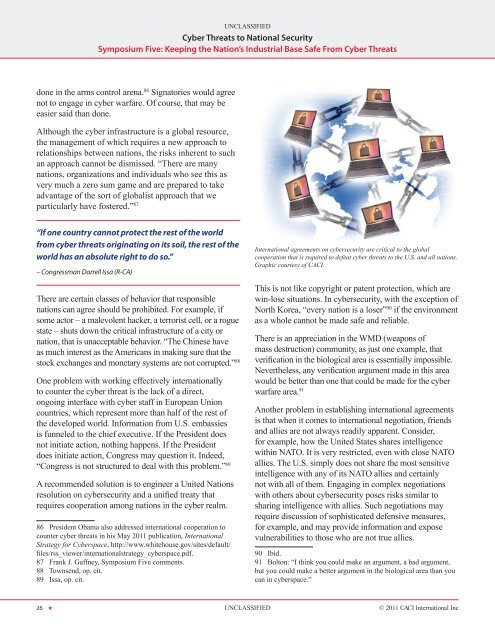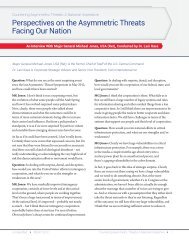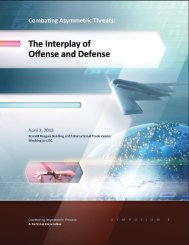Cyber Threats to National Security - The Asymmetric Threat
Cyber Threats to National Security - The Asymmetric Threat
Cyber Threats to National Security - The Asymmetric Threat
Create successful ePaper yourself
Turn your PDF publications into a flip-book with our unique Google optimized e-Paper software.
26 H<br />
<strong>Cyber</strong> <strong><strong>Threat</strong>s</strong> <strong>to</strong> <strong>National</strong> <strong>Security</strong><br />
Symposium Five: Keeping the Nation’s Industrial Base Safe From <strong>Cyber</strong> <strong><strong>Threat</strong>s</strong><br />
done in the arms control arena. 86 Signa<strong>to</strong>ries would agree<br />
not <strong>to</strong> engage in cyber warfare. Of course, that may be<br />
easier said than done.<br />
Although the cyber infrastructure is a global resource,<br />
the management of which requires a new approach <strong>to</strong><br />
relationships between nations, the risks inherent <strong>to</strong> such<br />
an approach cannot be dismissed. “<strong>The</strong>re are many<br />
nations, organizations and individuals who see this as<br />
very much a zero sum game and are prepared <strong>to</strong> take<br />
advantage of the sort of globalist approach that we<br />
particularly have fostered.” 87<br />
“If one country cannot protect the rest of the world<br />
from cyber threats originating on its soil, the rest of the<br />
world has an absolute right <strong>to</strong> do so.”<br />
– Congressman Darrell Issa (R-CA)<br />
<strong>The</strong>re are certain classes of behavior that responsible<br />
nations can agree should be prohibited. For example, if<br />
some ac<strong>to</strong>r – a malevolent hacker, a terrorist cell, or a rogue<br />
state – shuts down the critical infrastructure of a city or<br />
nation, that is unacceptable behavior. “<strong>The</strong> Chinese have<br />
as much interest as the Americans in making sure that the<br />
s<strong>to</strong>ck exchanges and monetary systems are not corrupted.” 88<br />
One problem with working effectively internationally<br />
<strong>to</strong> counter the cyber threat is the lack of a direct,<br />
ongoing interface with cyber staff in European Union<br />
countries, which represent more than half of the rest of<br />
the developed world. Information from U.S. embassies<br />
is funneled <strong>to</strong> the chief executive. If the President does<br />
not initiate action, nothing happens. If the President<br />
does initiate action, Congress may question it. Indeed,<br />
“Congress is not structured <strong>to</strong> deal with this problem.” 89<br />
A recommended solution is <strong>to</strong> engineer a United Nations<br />
resolution on cybersecurity and a unified treaty that<br />
requires cooperation among nations in the cyber realm.<br />
86 President Obama also addressed international cooperation <strong>to</strong><br />
counter cyber threats in his May 2011 publication, International<br />
Strategy for <strong>Cyber</strong>space, http://www.whitehouse.gov/sites/default/<br />
files/rss_viewer/internationalstrategy_cyberspace.pdf.<br />
87 Frank J. Gaffney, Symposium Five comments.<br />
88 Townsend, op. cit.<br />
89 Issa, op. cit.<br />
UNCLASSIFIED<br />
UNCLASSIFIED<br />
International agreements on cybersecurity are critical <strong>to</strong> the global<br />
cooperation that is required <strong>to</strong> defeat cyber threats <strong>to</strong> the U.S. and all nations.<br />
Graphic courtesy of CACI.<br />
This is not like copyright or patent protection, which are<br />
win-lose situations. In cybersecurity, with the exception of<br />
North Korea, “every nation is a loser” 90 if the environment<br />
as a whole cannot be made safe and reliable.<br />
<strong>The</strong>re is an appreciation in the WMD (weapons of<br />
mass destruction) community, as just one example, that<br />
verification in the biological area is essentially impossible.<br />
Nevertheless, any verification argument made in this area<br />
would be better than one that could be made for the cyber<br />
warfare area. 91<br />
Another problem in establishing international agreements<br />
is that when it comes <strong>to</strong> international negotiation, friends<br />
and allies are not always readily apparent. Consider,<br />
for example, how the United States shares intelligence<br />
within NATO. It is very restricted, even with close NATO<br />
allies. <strong>The</strong> U.S. simply does not share the most sensitive<br />
intelligence with any of its NATO allies and certainly<br />
not with all of them. Engaging in complex negotiations<br />
with others about cybersecurity poses risks similar <strong>to</strong><br />
sharing intelligence with allies. Such negotiations may<br />
require discussion of sophisticated defensive measures,<br />
for example, and may provide information and expose<br />
vulnerabilities <strong>to</strong> those who are not true allies.<br />
90 Ibid.<br />
91 Bol<strong>to</strong>n: “I think you could make an argument, a bad argument,<br />
but you could make a better argument in the biological area than you<br />
can in cyberspace.”<br />
© 2011 CACI International Inc




